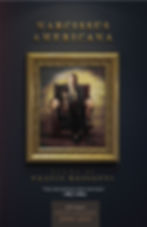.jpg)
TRAVIS MOSSOTTI
Apocryphal Genesis
Winner of the 2022 Alma Book Award
@ Saturnalia Books
Winner of the 2025 North American Poetry Book Award
Mossotti is such a graceful, graced poet—I marvel at all his turns and interweaves. He is truly one of the best.
—Naomi Shihab Nye
With his nose to the ground and his imagination open to miraculous possibilities, Travis Mossotti charts great personal and social discoveries, and he does it with a manner all his own and with an openness to others, and not just people. He does not deny chickens, fungi, or trees. Mossotti's allegiances go to the very center of America and his muse is Apollinaire. Apocryphal Genesis is a wonderful book.
—Rodney Jones
Startling, sometimes ground-shifting endings mark these poems. Along the way, Mossotti’s speakers are good company, coming at you from beside a river, or a yard filled with chickens, or a velvet seat at the opera. Or from across a table solemn with family and dinner. They speak into our new century’s swirling void, seeking the oak, the warm angel, the reader.
—Laura Newbern



Racecar Jesus
Winner of the 2022 Christopher Smart - Joan Alice Poetry Prize
@ Black Spring Press Group/Eyewear
Highly Commended for the 2024 Forward Prize
Travis Mossotti’s Racecar Jesus makes an impact from the very start with its immediately accessible voice and engaging style. The poems veer unpredictably, rather like a “Buzzfeed” channel, or a high velocity poetic consciousness careening headlong through 21st century Americana. There are lurid ruminations on God and spirituality, quirky, phenomenal imageries that provoke and delight, but there’s equally an eagerness to reach out and connect, to break through the habitual, the mundane, and to become more aware of “the catalogue of human sorrow [we] touch and withdraw from.” Mossotti has mastered the art of the confessional-conversational, combining wit with devastating juxtaposition, like an F1 jet-engine-fuelled Billy Collins on fire.
—Jason Eng Hun Lee, contest judge citation
Narcissus Americana
Winner of the 2018 Miller Williams Poetry Prize
@ University of Arkansas Press
Producing poems that are clear and mysterious, funny and serious, Travis Mossotti is one of a thriving group of American poets writing these days whose work exposes the mendacity of those who cite "difficulty" as an excuse for not reading poetry.
—Billy Collins
Travis Mossotti’s Narcissus Americana makes legible and lyrical the flown-over eros of the heartland son: who inherits the dreams of uncharted newness, who destines a newness of himself, who turns to face a hardened plain not unlike Lauren Berlant’s "cruel optimism." The poet often takes the stage with offerings of futile comedy and figuration as relief, only to be booed away by the speaker who, hungover after Hollywood and delusions less bright, can no longer stomach any more of the American spirit. The narcissism resonates: how easy it has been to always aspire, to desire "to be a Genesis" or an escape artist, to "dream that you were an ode or epic/ surviving the millennia unscathed," to want a bankruptcy of damns to give. And yet, spectacularly, Mossotti grinds us only to ground us in this upset: there is "no way/ to upstage what we have."
—Justin Phillip Reed
Field Study
Awarded the 2013 Melissa Lanitis Gregory Poetry Prize from Bona Fide Books, Field Study is a window into Travis Mossotti’s time in the field over the last decade, working with his wife (a carnivore biologist) on endangered species recovery efforts all across North America—from processing kill sites with the Yellowstone Wolf Project to tracking red wolves on the eastern edge of the Outer Banks. The book engages the tradition of American naturalist writers and offers a rare in situ examination of the relationship between humans and the environments humans occupy, manipulate, destroy, and share, to greater or lesser extents.
Wolves need as many voices as they can get, and Travis Mossotti's Field Study is certainly a powerful and welcome addition.
—Douglas Smith, Project Leader for the Yellowstone Wolf Project
In Field Study, Mossotti sponges wolf spoor from the rut of a sandy road and gives it to us, challenging us to go beyond merely appreciating nature—“I’ve learned that words like awe / are only part of it,” he says. Mossotti’s poems remind us that we need to collectively respond to the principle that the howl of the wolf must not be muted from the American landscape.
—William Waddell, Red Wolf Species Survival Plan Coordinator












